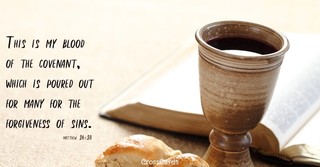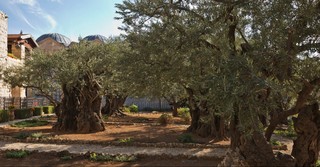- Recent Translations
- All Translations
Matthew 26:36
Share
Settings
Matthew 26:36 Meaning and Commentary
Then cometh Jesus with them
The eleven disciples,
unto a place called Gethsemane;
the Syriac version calls it Ghedsiman; the Persic, Ghesmani, so the Arabic; the Vulgate Latin, and the Ethiopic, Gethsemani: in Munster's Hebrew Gospel, and in the Vulgate Latin, and Arabic versions, it is called a "village"; and in the Ethiopic version, "a village of wine"; and in the Syriac and Persic versions, a place. Here, according to an Ethiopic writer, the Virgin Mary was buried by the apostles F4. Its etymology is very differently given: some read, and explain it, as if it was (Mynmv yg) , "a valley of fatness", or "of olives", as it is called in Munster's Hebrew Gospel; see ( Isaiah 28:1 ) ; others as if it was (ynmyod yg) , "a valley of signs", or a very famous valley; so Mount Sinai is called {e}, (yanmyo rh) , "Harsemanai", the mountain of signs: but, to take notice of no more; the true reading and signification of it is, (ynmv) (tg) , "an olive press", or a press for olives: so we read F6 of a chamber in the temple which is called "the chamber", (aynmv tyb) , "Beth Semania", or "Bethsemani", where they put their wine and oil for temple service. It is very probable that at, or near this place, was a very public olive press, where they used to squeeze the olives, for the oil of them, which they gathered in great plenty from off the Mount of Olives; at the foot of which this place was; and a very significant place it was for our Lord to go to at this time, when he was about to tread the wine press of his Father's wrath, alone, and of the people there were none with him: for it follows,
and saith unto the disciples, sit ye here, while I go and pray
yonder:
perceiving a time of distress was coming upon him, he betakes himself to prayer, an example worthy of our imitation; in the performance of which duty he chose to be retired and solitary, and therefore left eight of his disciples at a certain place, whilst he went to another at some distance, convenient for his purpose; who perhaps might be the weakest of the disciples, and not able to bear the agonies and distress of their Lord and Master.
F4 Ludolph. Lex. Ethiop. p. 554.
F5 T. Bab. Sabbat, fol. 89. 1.
F6 T. Bab. Yoma, fol. 16. 1.

